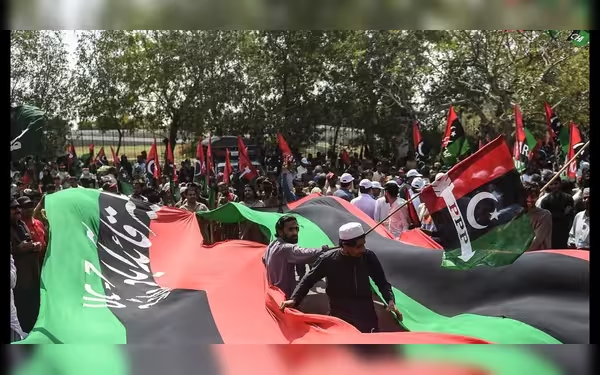Saturday, November 16, 2024 07:37 PM
PPP Dominates Local Body Elections in Karachi 2024
- PPP wins 8 out of 10 contested seats in Karachi.
- Jamaat-e-Islami faces significant losses in key areas.
- Low voter turnout raises concerns among political analysts.
 Image Credits: hamariweb
Image Credits: hamariwebPPP secures 8 out of 10 seats in Karachi's local body elections, while JI faces setbacks amid low voter turnout.
The recent local body elections in Karachi have marked a significant shift in the political landscape of the city. The Pakistan People’s Party (PPP) has emerged victorious, demonstrating a strong performance in the by-elections. This victory is particularly noteworthy as it comes amidst a backdrop of intense competition and changing voter sentiments.
In the by-elections, the PPP managed to secure 8 out of the 10 contested seats, showcasing their dominance in various localities. The party won 3 chairman positions, 1 vice-chairman position, and 4 ward member spots. This impressive sweep indicates a solidified support base for the PPP in Karachi, especially in areas where they have historically faced challenges.
On the other hand, the Jamaat-e-Islami (JI) faced a significant setback, losing ground in key areas such as Liaquatabad. The party could only claim 2 seats, which included 1 chairman and 1 ward member seat. This decline in their local popularity raises questions about their future strategies and voter engagement efforts.
One of the standout victories for the PPP was in District Malir’s UC 7 Ward 4, where Asif Khan secured 994 votes, defeating JI’s Ikramullah and independent candidate Azam Khan. Similarly, in UC 9 of District Malir, Babar Magsi won the chairman position with a remarkable 2,493 votes, leaving JI’s Noman Ahmed far behind with only 528 votes.
In Baldia Town’s UC 10, Iqrar Hassan of the PPP claimed victory with 374 votes, surpassing independent Usama and JI’s Muhammad Taha. Furthermore, in Korangi’s UC 7 Ward 1, Murtaza Qureshi of the PPP tallied 1,045 votes, defeating JI’s Kamran and independent Muhammad Wasim. The vice-chairman seat in Landhi Town’s UC 6 also went to PPP’s Umair Ahmed Khan Durani, who won with 1,775 votes.
Despite the PPP's success, the overall voter turnout was noticeably low, which has sparked discussions among political analysts and party leaders. This low engagement could indicate a growing disinterest among the electorate or a need for parties to better connect with their constituents.
The results of these elections not only reflect the current political dynamics in Karachi but also set the stage for future contests. As the PPP consolidates its power, the JI will need to reassess its strategies to regain lost ground. The changing political landscape in Karachi is a reminder of the fluid nature of local politics, where voter preferences can shift rapidly.
The 2024 local body elections have provided a clear picture of the current political climate in Karachi. The PPP's strong performance signals a potential resurgence in their influence, while the JI's decline raises important questions about their future. As the political scene evolves, it will be crucial for all parties to engage with voters and address their concerns to remain relevant in the ever-changing landscape of Karachi's politics.













